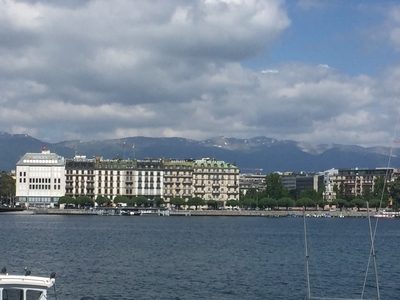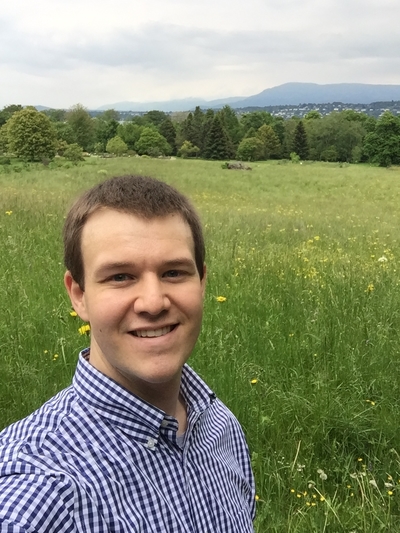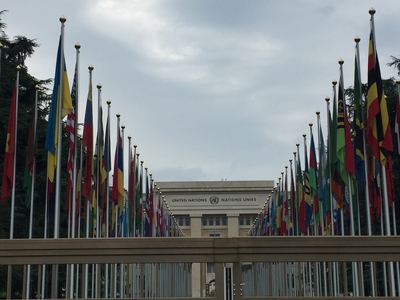Week 1: Arriving in Geneva
When I first got to Geneva it was 7am, it was raining, and I had not slept in 24 hours. After I managed to wind my through the streets to get to my apartment in downtown Geneva, I collapsed on the bed and woke up 8 hours later. Feeling more functional, I then decided to take a look around the surrounding neighborhood, knowing that I had three days before my internship started. After walking around for a couple of hours, I found out that that Geneva is massive, or at least it seemed that way to me since I come from a small city in Indiana and Williamsburg is not much to look at either. After walking through the streets and looking at all of the various shops and restaurants, I found myself staring at Lake Geneva with mountains surrounding me on all sides, an absolutely breathtaking sight.
Geneva is absolutely beautiful. I spent the next two days wandering along the banks of the lake and exploring old town in Geneva. I managed to find the UN, several amazing parks and nature preserves and even an impromptu zoo. I ended up walking about 16 miles during this time and had thoroughly worn myself out. With only one day left before my internship at IBJ started, I decided to take a little break and tried to recuperate before I had to show up at the office at 9am for orientation.
Finally, it was time to start my internship and after walking through Geneva for about twenty minutes I arrived at the building that housed IBJ. The office of IBJ is located up a winding staircase on the third floor of a shared office building. It is a fairly small office but it works perfectly for their activities there. I was quickly introduced to some of the staff and the other interns that were there already. Everyone was very friendly and it was great to see so many people from all over the world who were passionate about promoting human rights and the rule of law. The CEO and founder, Karen Tse, and Sanjeewa Liyanage, the international programs director, were not at the office when I arrived as they were currently working in the Democratic Republic of the Congo to establish a new program there, an amazing feat which was apparently moving along rather quickly. After getting to know everyone I was given a lot of material to read about the programs of IBJ, its goals, its future plans, and some success stories. It was great to see all of the ambitious plans that IBJ had developed and I felt a sense of pride for the work that IBJ had done when reading the success stories. I read stories of small children accused of stealing bicycles and being thrown in jail for ridiculous periods of time without trial and stories of men, women, and children, being forced to confess to crimes they did not commit under the pressures of torture. The work that IBJ does is truly incredible. To finish off the day, I helped another Intern, John, proof read a general proposal he was working on that Sanjeewa needed the next day for a presentation. I stayed a couple of hours later in order to help with this but it did not feel like very long at all because the information was interesting and the people surrounding me kept the mood very cheerful and uplifting.
At the start of my second day, I finished up the edits that I was working on the day before and then went with Ramin Hashemi, the Chief Operating Officer, along with two other interns to meet with Sanjeewa briefly at the train station and then to go out for lunch. We gave Sanjeewa the general proposal and I was able to briefly meet him before he quickly boarded another train to head to another meeting. Sanjeewa was extremely friendly and I can tell that I will enjoy working with him. After eating lunch we went back to the office and I was given my first assignment. Ramin tasked me with helping to draw up a proposal for an application for emergency aid for Burundi from the UN Voluntary Fund for Victims of Torture (UNVFVT). IBJ wanted to secure aid for their operation in Burundi which is one of their areas of operation that most desperately needed help. I started researching the UNVFVT and the requirements for the application process, and I continued working on this for the little time that I had left before it was time to pack up and head back to my apartment. I can already tell that I will enjoy my time at IBJ and that this opportunity will be extremely rewarding.
The next day I continued my research on the UNVFVT and started background research on Burundi and the quickly escalating situation there. I found a lot of fascinating, yet disturbing, statistics and accounts about the situation in Burundi. For example, Burundi’s prison population is at 214.5% capacity with over 56.7% of the prisoners being held as pre-trial detainees. These prisoners languish in prison for an average of two and a half years before they ever see a trial or hear an accusation. Since the announcement in 2015 that Burundi’s President, Pierre Nkurunziza, would be running for a third term (Burundi’s 2005 constitution limits a President to two terms) and following President Nkurunziza’s reelection, the situation in Burundi has rapidly deteriorated with increases in random killings, torture, and detention. Because of this mounting crisis, IBJ decided to choose Burundi for the emergency relief proposal to the UN. This developing situation threatens to tear open the wounds of the twelve-year civil war that ended in 2005, leaving over 300,000 people dead. This type of situation perfectly showcases exactly why the work of IBJ is so important. Without the staff and lawyers at IBJ, the people in Burundi who have been detained for stealing a phone, being accused of espionage, or simply being in the wrong place at the wrong time, would never know they had a right to an attorney or the right to be free from torture. IBJ does not seek to help only a select few people, IBJ’s goal is far broader. Every individual in need, whether they were arrested for petty theft and have been held for two months or if they were accused of espionage and have been held for two years, IBJ does not pick and choose who receives critical information about their legal rights.
At the end of the week I finally started writing the proposal to the UNVFVT starting with the background information on Burundi and transitioning to how IBJ’s goals and resources were best suited to handle this exact type of crisis. As I worked on this proposal, the office got news that Karen would be returning from the DRC soon. A few hours later, while I was still working on the proposal, Karen arrives and greets everyone. She is extremely friendly and she pulls all of the new interns aside, including me, to talk with each one individually to get to know us. Next, the whole office gathered together in the conference room to talk about Karen and Sanjee’s trip. Karen’s stories and recollections about her experiences in the DRC were absolutely fascinating. Karen and Sanjee had gone into the country to try and set up a relationship with the Minister of Justice and get a memorandum of understanding signed (MOU). Normally this is a lengthy process that can take weeks or months but somehow they got it accomplished in one day. IBJ now has a signed MOU with the Minister of Justice in the DRC, something that Karen says even the American Bar Association doesn’t have. After letting us know about her success with the MOU, she told us more about her travels including the many bribes that they had to pay to corrupt police and security guards in the airport just to leave the building. Karen then explained the condition of the prison that she visited which was overcrowded, filthy, corrupt, and had a large drug operation running within it that put money directly into the pockets of the guards. She met with men and women who had been in jail for months because they owed small amounts of money (such as $40 for stealing a phone) but because they could not pay that money back, they were forced to remain in prison. Karen even talked with a woman that was arrested because her husband owed a debt. The police could not find the husband so they arrested the woman instead.
Perhaps the most interesting topic that Karen talked about was her personal struggle with the knowledge that she has to be friends with many horrible people in order to get anything done. The director of the prison, the Minister of Justice, prison guards, and many others are responsible for egregious human rights violations including torture. Karen explained that in order to get an MOU signed or any other similar document, she has to find something about each one of these people to legitimately like so that she can be friends with them and convince them to allow IBJ to work in the area. It is not something that you can fake because most people can tell when you are genuinely being friendly and when it is just an act. This was extremely intriguing to me as I have never thought about this issue before but as Karen explained it, it made total sense. Overall, this meeting with Karen was very eye-opening and it taught me so much about the intricacies of developing human rights and the rule of law in a new area. At the end of my first week, I know that I made the right choice when I applied to IBJ for this internship, this is going to be an amazing summer.


